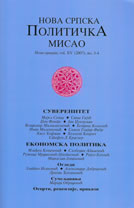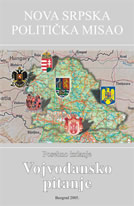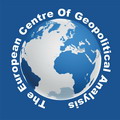| NSPM in English | |||
From Isolation to Stabilization – The New Opening in Serbian Foreign Policy |
 |
 |
 |
| среда, 12. мај 2010. | |
|
May skilful balance between four main actors of the world geopolitics become a factor facilitating the achievement of the main goal (which the integration with EU undoubtedly is for Serbia)? President Boris Tadic many times emphasised that the priorities of foreign policy of his country are integration in the EU and fight for the territorial integrity of the Serbian state. Even though a few years ago this kind of declarations would sound like a good joke, now they are much more realistic. By the end of December 2009, Serbia officially applied for the membership in EU, which may be perceived as a kind of crowning of the rule of Tadic’s Democratic Party. It appears that even Russia is not able to change the pro-EU direction of Belgrade’s policy. Although Russia made recently a few meaningful steps (important agreements concerning sources of energy), this country does not seem to oppose the direction chosen by its „Orthodox brothers”. The inclusion of such important geopolitical players as United States and China into their foreign policy may determine Serbian stance concerning the independence of Kosovo, that is not going to be change in foreseeable future. The dimension inside the dimension While trying to analyse Belgrade’s foreign policy one should distinguish two main dimensions, that (considering priorities and geographical location) may be called: main (Europe) and complementary (China and United States). Main dimension consists of relations with EU, Moscow, and widely understood countries of region. Serbian application considering membership in the EU which was made by president Tadic in December 2009 confirmed the overriding importance of this vector among the political goals of Belgrade. The recent increase of activity in the policy of Brussels towards Serbia (signing the SAA treaty, unblocking the transitory trade agreement, cancellation of EU visa obligation for the citizens of Serbia, Montenegro, and Macedonia) is undoubtedly an effect of the switch in perception of this country by Western politicians. One of the determining factors of this switch is the potentation of activity of Russia, which is called by many “The immemorial ally of Serbia”. The relations with Brussels may be called a kind of „dimension inside dimension”, because other elements stimulating Serbian foreign policy are – in greater or lesser extent – subordinated to it. From this perspective one may perceive relations with Russia, which is gaining wider and wider influence in this part of Europe in the new geopolitical (power resource) round. An ability to oppose EU with other actors of international politics, like Moscow or Beijing, is an exquisite tactic and a source of considerable profits for Belgrade. It is hard to avoid a comparison of this strategy with the policy of Marshall Tito and his “active non-alignment”, which made a kind of a bridge between both sides of the Iron Curtain which were hostile towards each other. While examining the determination of the relations with EU by simultaneous relation with Russia or China one should emphasize that it is not Belgrade who is the main player in those relations. The four-pillar policy of Serbia is of course a factor that Brussels must take into account. However, EU has a very strong moral, political, and economic position in its relations with Belgrade and that is why it undoubtedly dominates in this relation. However, some commentators express anxiety that Serbia as a future member of European Union may become another instrument of Russian foreign policy towards the European commonwealth. Russian strategy is based on “drawing” different EU countries into cooperation (Germany, and recently also France may provide a good example), what serves as a perfect factor which is destabilizing the internal cohesion of the EU. The economic interests of Serbia (mainly in the power resource sphere) are tightly connected with Russia. Serbia has a chance to become a kind of “Russian link”, which may affect negatively its current integration process. If Brussels slows down this process, it will show its weakness and lack of idea for its rivalry with Russia in the area of the Balkans. EU politicians also notice that fact – recently they have accelerated the process of making decisions concerning Belgrade. Recent discussion about possibility of Serbian access to NATO is another field of animosity with Russia. Both European politicians and General Secretary of NATO emphasize that they are interested in full integration of the region with Europe, which means for its countries joining both EU and NATO structures. However because of the low level of support for this idea among Serbian society (majority of Serbs still perceive NATO as an enemy who has attacked them in 1999) the question is still not raised by the Serbian authorities, sooner or later it will be raised for sure. Talking about EU-Serbian and Russian-Serbian relations, one cannot avoid such an important factor as Kosovo question. The fight for territorial integrity of the state is one of the main determinants stimulating Serbian engagement in relations with Moscow and Beijing, so useful, for example, during the trial in the International Court of Justice concerning the legitimacy of the Kosovo declaration of independence from the point of view of the international law. All show pillars Calling Moscow, Beijing or Washington the main pillars of foreign policy is an act of political slyness. The question of Kosovo, that connects relations with those subjects, may be serving as a proof. The four pillar foreign policy of Serbia may be called “the policy of maximum benefit”, that was skilfully introduced into geopolitical square of the contemporary world. Pro-EU direction chosen by Belgrade has a big chance for success. That is why we should not expect any rapid change of this course, even if the government changes. The increasing possibility of early parliamentary election does not pose any threat for the main vector of Serbian foreign policy. The opposition party SNS (Srpska Napredna Stranka – Serbian Progressive Party) is now the major rival of the ruling Democratic Party. It has emerged quite recently as a result of a split in the former main opposition party SRS (Srpska Radikalna Stranka – Serbian Radical Party). The leader of SNS Tomislav Nikolic (not long ago he used to be a „right-hand man” of SRS leader Vojislav Šešelj) decided to do it, because he noticed how important the integration with EU has become for his country. As it was mentioned before, relations with Moscow and Beijing are determined, apart from purely economical issues, mainly by support for Serbian territorial integrity given by those countries. However, this support is more and more nominal. The attitude of Russia, which acknowledged the independence of Abkhazia and South Ossetia after a war with Georgia of the year 2008, put its reliability concerning Kosovo under question. The similar intensity may be noticed in the relations with Washington, which started to be meaningful only in the last year. The visit of US vice-president Joe Biden to Belgrade in May, 2009, was the first visit of such an important US representative to Serbia after the bombardments of 1999. It is difficult to expect intensity from the relations which are now being built. Nevertheless, Belgrade appears to treat Washington as an “ally” who may have a crucial influence on the future Serbian membership in EU. Mutual addiction Different pillars of Serbian foreign policy display much manifestation of mutual addiction and determination. This skilfully initiated tactics is undoubtedly a noticeable novelty of Belgrade compared to other countries of the region. Contrary to other Balkan countries, Serbia did not choose its access into EU the one and only goal that everything else should be subordinated to. The unwillingness to join NATO may serve as an example here. Serbia wants to play a role of a regional leader again – to be a bridge between the East and the West. In spite of those aspirations, we may say that in some extent Serbia will play this kind of role, but as a member of EU. From this point of view, this aspect may be perceived as a reinforcement of the geopolitical position of Brussels. It appears that the scenario of the “Russian link” is quite unlikely or at least not important from the point of view of internal stability of the EU. Russia will be present at Balkans, but nevertheless this region will be marginal from the point of view of Russian political interest concerning Europe. Regional leader As it was already mentioned, from the point of view of integration with EU structures, Serbia significantly differs from other states from the region of Western Balkans. Of course the tactics of Belgrade is not only based on the current needs of the country. It also has a solid historical basis. When we examine the contemporary geopolitical structure of region, we notice quite an unhesitating return of Serbia to the role of a leader. Apart from political aspects, the level of advancement in the integration with EU. Serbia is getting closer and closer to the leaders (Croatia, Macedonia). The leading role of Serbia in the region facilitates widely understood stabilization in the region. Not only politicians in Brussels, but also regional players like Slovenia, Greece and Romania notice it. The new opening in the Serbian politics makes possible the establishment of the new relations with the neighbours. This fact has an immediate effect on the stability of geopolitical reality in Western Balkans. Recently (after presidential elections in Croatia) there appeared a chance to normalize the relations with Zagreb. There is no need to convince anyone how many different factors divide Serbs and Croatians, but Ivo Josipovic’s victory in presidential election creates a great chance for a constructive dialogue between both sides. The new president of Croatia during his presidential campaign emphasised many times that he perceives good relations with Belgrade as his biggest challenge. The fact that the president Josipovic invited president Tadic to the ceremony of his presidential oath can be seen as a symbol of the process of détente between both countries (However, Tadic rejected the invitation because of the presence of the president of Kosovo on the ceremony). The ongoing discussion in the Serbian parliament (Skupstina) about the resolution concerning the events in Srebrenica is also important in this context. In spite of the fierce arguments over the contents of the document, we should notice the fact that the process of facing the difficult issues from the past (Croatia and Bosnia and Herzegovina were among the countries that insisted on it) is slowly beginning. Undoubtedly, cooperation between Serbia and Croatia is good news for EU. Zagreb and Belgrade have all the prerequisites necessary at least to influence the state of permanent crisis in Bosnia and Herzegovina. Conclusions There can be only one conclusion of the analysis of the current position of Serbia in geopolitical structure of Europe and the World – it has undergone a complete change and re-evaluation. The choice of the pro-EU direction is in a way a result of a lack of alternative solution in contemporary Europe. Serbia after 1999 is still a country with weak economy that is not able to preserve full neutrality. Nevertheless, Belgrade tries to emphasize its own mind and raise the level of its international prestige through the alliance with Moscow, China or USA. Undoubtedly, Serbian future should be connected mainly with the EU. Serbia should become a member of European Union about the year 2015. This optimistic prognosis is based on the will of the current Serbian authorities to implement all the reforms demanded by Brussels. EU is also interested in cooling down the “Balkan cauldron” as soon as possible. However, there exists some anxiety (mainly among the oldest members) that may slow down the accession of the countries of Western Balkans to European Union. For example, Germany and France oppose accession of the further countries of Western Balkans, claiming that after the accession of Croatia the process of EU enlargement should definitely slow down. Irrespectively of the subject of its integration with EU, Serbia is returning to the position of political leader of the region. The four-pillar policy was undoubtedly that main factor that facilitated this process by authenticating the country in the eyes of the other states of the region. (The author is an associate of Polish Non-Government Organization European Centre of Geopolitical Analysis) |
Остали чланци у рубрици
- Playing With Fire in Ukraine
- Kosovo as a res extra commercium and the alchemy of colonization
- The Balkans XX years after NATO aggression: the case of the Republic of Srpska – past, present and future
- Из архиве - Remarks Before the Foreign Affairs Committee of the European Parliament
- Dysfunction in the Balkans - Can the Post-Yugoslav Settlement Survive?
- Serbia’s latest would-be savior is a modernizer, a strongman - or both
- Why the Ukraine Crisis Is the West’s Fault
- The Ghosts of World War I Circle over Ukraine
- Nato's action plan in Ukraine is right out of Dr Strangelove
- Why Yanukovych Said No to Europe

.jpg)








 In recent years the geopolitical position of Serbia is undergoing a complete transformation. The state that not long ago was perceived as a “black sheep” of the European herd now is one of the leaders of all the activities in the region. There is no doubt that Belgrade has re-defined the main foundations of its foreign policy, which now belong to two different dimensions that determine each other.
In recent years the geopolitical position of Serbia is undergoing a complete transformation. The state that not long ago was perceived as a “black sheep” of the European herd now is one of the leaders of all the activities in the region. There is no doubt that Belgrade has re-defined the main foundations of its foreign policy, which now belong to two different dimensions that determine each other.













